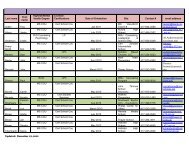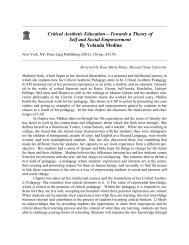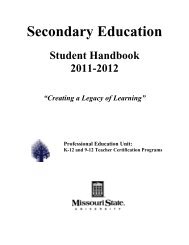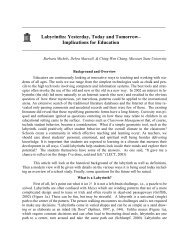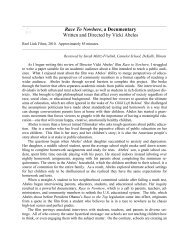An Obligation to Endure - College of Education
An Obligation to Endure - College of Education
An Obligation to Endure - College of Education
Create successful ePaper yourself
Turn your PDF publications into a flip-book with our unique Google optimized e-Paper software.
Critical Questions in <strong>Education</strong> (Special Issue) Volume 4:2 133<br />
learners’ (and our own) multiple life-challenges complicated by global climate change (henceforth<br />
GCC), educa<strong>to</strong>rs need more <strong>of</strong> this field’s intellectual resources for such practical questioning.<br />
Not fewer.<br />
But, like journalism, institutional education has undergone another man-made climate<br />
change over the past two decades or more, 23 a societal change that threatens <strong>to</strong> remove educational<br />
foundations from formal preparation for the education pr<strong>of</strong>ession, as reported recently at<br />
University <strong>of</strong> Georgia. This educational climate change (henceforth ECC) has sustained general<br />
pr<strong>of</strong>essional evasion <strong>of</strong> foundational questions about education that might respond more pragmatically<br />
<strong>to</strong> GCC.<br />
This special issue is not questioning how <strong>to</strong> sustain life on earth or even just inquiringlife,<br />
but how <strong>to</strong> defend educational foundations. Countless symposia and panels have discussed<br />
this <strong>to</strong>pic at various Council <strong>of</strong> Social Foundations <strong>of</strong> <strong>Education</strong> member organizations’ conferences<br />
over the past quarter century, so educational foundations scholars know our self-defense<br />
scripts well enough <strong>to</strong> recite them by heart <strong>to</strong> any colleagues, deans, state chancellors and state<br />
superintendents who might listen. No need <strong>to</strong> rehash them here. How <strong>to</strong> respond <strong>to</strong> this call for a<br />
“defense” without homiletic or polemical platitudes about educational wisdom’s obvious value,<br />
fraught with reasonable concerns about democracy’s future?<br />
Much disciplined inquiry has already addressed this special issue’s <strong>to</strong>pic, “the defense <strong>of</strong><br />
educational foundations,” in other special issues <strong>of</strong> Teachers <strong>College</strong> Record, <strong>Education</strong>al Studies,<br />
and other journals—responding <strong>to</strong> its urgency both indirectly and directly with recent major<br />
productions such as the Encyclopedia <strong>of</strong> the Social and Cultural Foundations <strong>of</strong> <strong>Education</strong>, 24 the<br />
Handbook <strong>of</strong> Research in the Social Foundations <strong>of</strong> <strong>Education</strong>, 25 parts <strong>of</strong> the forthcoming Handbook<br />
<strong>of</strong> <strong>Education</strong>al Theories, 26 and other similar volumes (including some focused specifically<br />
on philosophy or his<strong>to</strong>ry <strong>of</strong> education), along with some anthologies on foundational pedagogy<br />
and curriculum. 27 Schooling myself in that research literature, I have discussed issues related <strong>to</strong><br />
this <strong>to</strong>pic with colleagues here and elsewhere, in education and in arts and humanities—faculty,<br />
students, and administra<strong>to</strong>rs. This extensive reading and conversation have proven <strong>of</strong>ten provocative,<br />
sometimes exhilarating. But I must be frank: this searching, ruminative study in light <strong>of</strong><br />
my experience over the past three decades has led me <strong>to</strong> a <strong>to</strong>ugh sore spot with this tired <strong>to</strong>pic—<br />
which even my critical review <strong>of</strong> defensive research in, about, and for educational foundations<br />
could scarcely begin <strong>to</strong> theorize. This <strong>to</strong>pic’s frame, the ECC now shaping our field’s internal<br />
struggle <strong>to</strong> endure, merits educational foundations scholars’ seriously strategic, sustained attention.<br />
<strong>Education</strong>al foundations scholars promote <strong>of</strong>ten the value <strong>of</strong> pre-service teachers’ learning<br />
about school and society, yet how <strong>of</strong>ten do we consider likely comparable value in preservice<br />
pr<strong>of</strong>essors’ learning about university and society? Could neglect <strong>of</strong> such graduate education<br />
for the pr<strong>of</strong>essoriate have contributed <strong>to</strong> this ECC that now threatens educational founda-<br />
revitalize educa<strong>to</strong>rs’ commitment <strong>to</strong> empower future generations <strong>to</strong> confront and resolve the ecological, social, economic, and<br />
political challenges the 21st century.”<br />
23. On this point, see: Jim Parsons & William Frick, “Why Pr<strong>of</strong>essors Hate Their Jobs: A Critique <strong>of</strong> the Pedagogy <strong>of</strong> Academic<br />
Disengagement,” in Culture, Society & Praxis, 7 (2008), 2: 30-46. (However, quite frankly I love my own job.)<br />
24. Eugene F. Provenzo, Encyclopedia <strong>of</strong> the Social and Cultural Foundations <strong>of</strong> <strong>Education</strong> (New York: Sage, 2008).<br />
25. Steven Tozer, Bernardo Gallegos, <strong>An</strong>nette M. Henry, et al, eds., Handbook <strong>of</strong> Research in the Social Foundations <strong>of</strong><br />
<strong>Education</strong> (New York: Routledge, 2011).<br />
26. Beverly J. Irby, Genevieve Brown & Shirley Jackson, eds., Handbook <strong>of</strong> <strong>Education</strong>al Theories (Charlotte, NC: Information<br />
Age Publishing, 2013).<br />
27. For example, see Dan W. Butin, ed., Teaching Social Foundations <strong>of</strong> <strong>Education</strong>: Contexts, Theories, and Issues (Mahwah,<br />
NJ: Lawrence Erlbaum Associates, 2005).




